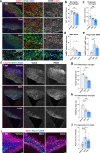Pharmacogenomic screening identifies and repurposes leucovorin and dyclonine as pro-oligodendrogenic compounds in brain repair
- PMID: 39537633
- PMCID: PMC11561360
- DOI: 10.1038/s41467-024-54003-9
Pharmacogenomic screening identifies and repurposes leucovorin and dyclonine as pro-oligodendrogenic compounds in brain repair
Erratum in
-
Author Correction: Pharmacogenomic screening identifies and repurposes leucovorin and dyclonine as pro-oligodendrogenic compounds in brain repair.Nat Commun. 2025 Jan 9;16(1):538. doi: 10.1038/s41467-025-55864-4. Nat Commun. 2025. PMID: 39788999 Free PMC article. No abstract available.
Abstract
Oligodendrocytes are critical for CNS myelin formation and are involved in preterm-birth brain injury (PBI) and multiple sclerosis (MS), both of which lack effective treatments. We present a pharmacogenomic approach that identifies compounds with potent pro-oligodendrogenic activity, selected through a scoring strategy (OligoScore) based on their modulation of oligodendrogenic and (re)myelination-related transcriptional programs. Through in vitro neural and oligodendrocyte progenitor cell (OPC) cultures, ex vivo cerebellar explants, and in vivo mouse models of PBI and MS, we identify FDA-approved leucovorin and dyclonine as promising candidates. In a neonatal chronic hypoxia mouse model mimicking PBI, both compounds promote neural progenitor cell proliferation and oligodendroglial fate acquisition, with leucovorin further enhancing differentiation. In an adult MS model of focal de/remyelination, they improve lesion repair by promoting OPC differentiation while preserving the OPC pool. Additionally, they shift microglia from a pro-inflammatory to a pro-regenerative profile and enhance myelin debris clearance. These findings support the repurposing of leucovorin and dyclonine for clinical trials targeting myelin disorders, offering potential therapeutic avenues for PBI and MS.
© 2024. The Author(s).
Conflict of interest statement
Figures










References
-
- Harrison, M. S. & Goldenberg, R. L. Global burden of prematurity. Semin. Fetal Neonatal Med.21, 74–79 (2016). - PubMed
-
- Luu, T. M., Rehman Mian, M. O. & Nuyt, A. M. Long-term impact of preterm birth: Neurodevelopmental and physical health outcomes. Clin. Perinatol.44, 305–314 (2017). - PubMed
-
- Walani, S. R. Global burden of preterm birth. Int. J. Gynecol. Obstet.150, 31–33 (2020). - PubMed
Publication types
MeSH terms
Substances
Associated data
- Actions
- Actions
- Actions
- Actions
- Actions
- Actions
- Actions
- Actions
Grants and funding
LinkOut - more resources
Full Text Sources
Molecular Biology Databases

